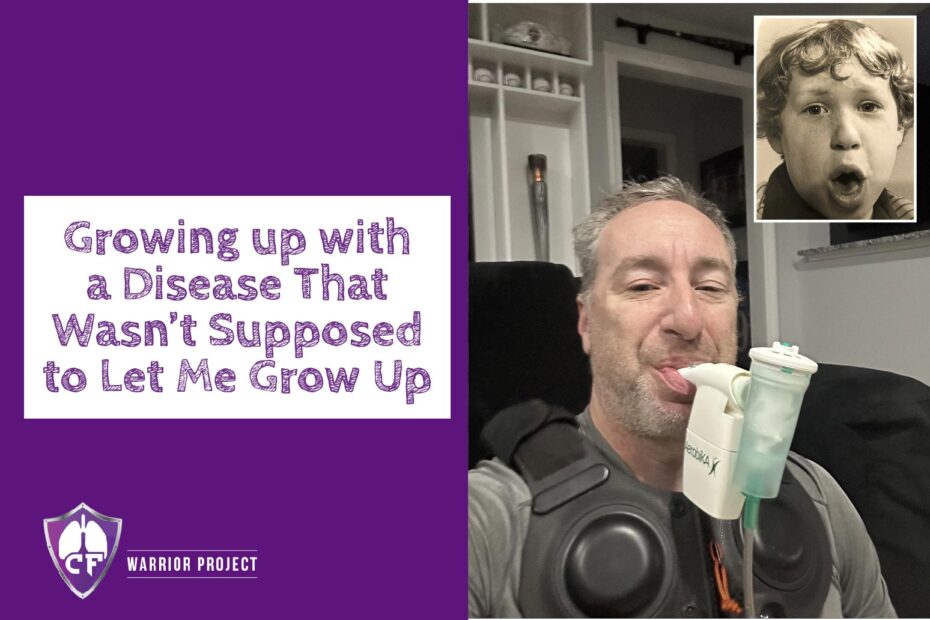There is not a cure for cystic fibrosis (CF), an unfortunate fact I’ve been aware of since I was a little boy attending a multitude of clinic appointments at a high-level trauma center in my hometown of Atlanta.
When I was a little boy, I was all but sure I was going to die from this disease. CF, after all, was the most common genetic killer in the United States, affecting the lungs, digestive system, sinuses, reproductive system and so many other organs and bodily functions.
This was a children’s disease. Adult centers did not even exist because CF patients rarely lived to adulthood. So, if I wanted any chance at living beyond my teens, I was going to have to focus on taking care of myself and that meant committing to a combination of activities: (1) having my parents administer a chest physiotherapy technique called postural drainage each day in which they would try to loosen the mucus from my lungs by cupping their hands while hitting my sides, front and back while I alternated positions, (2) taking multiple pancreatic enzymes with each meal to break down fats, proteins and carbohydrates so my body could absorb the nutrients, and (3) exercising consistently even though I was considerably weaker than most athletes my age.
During my youth, I read articles in reference books, saw Made-for-TV movies and viewed several commercials featuring family members whose desperate fundraising pleas included the mentioning of our vastly limited life expectancies. When you’re trying to eradicate a disease that prevents children from reaching adulthood, sob stories are an absolute must. Few realize though how these stories traumatize the patients.
As a teenager, I became keenly aware how different my physique looked compared to my “healthy” peers. I was skinny, weak and looked unwell. And then there was that cough. More like a terrible jag. Not only was it painful but it introduced itself at the worst possible times – in a packed movie theater, in the middle of a quiet library and in the midst of a laugh in a crowded room which often provided awkward stares in my direction.
I also remember the questions from classmates:
“Are you contagious?”
“Why are you so skinny?”
And the worst one, “Are you going to die?”.
For those of us now in our 50s, 60s and even 70s with this disease, we are considered unexplained phenomena. We miraculously outlived pay phones, record players and even Y2K.
Whenever I’m introduced to a medical professional these days and that person finds out I have cystic fibrosis, I witness the infamous double take. I understand how someone could feel perplexed at my presence. It’s not every day that you encounter a person with a chronic lung disease who has lived long enough to qualify to receive AARP benefits. At 51 years of age, I am considered “elderly” in the cystic fibrosis community.
To address the elephant in the room, I have no clue why I’m still here. Yes, I’ve worked hard to adhere to a rigorous exercise routine, to consistently administer my physiotherapy treatments each day which I now do while wearing a vibrating vest, and to take an abundance of medications to prevent my symptoms from worsening. Yes, I’ve been able to take breakthrough meds that others before me or even with me were not able to take including a CFTR modulator called Trikafta which has allowed me to take deep breaths for the first time in my life. Yes, I’ve been very lucky as many people I’ve known and many I didn’t know including my older sister Wendy have lost their lives to cystic fibrosis.
Today, things are remarkably different. Gone for the most part are the sob stories, the stereotypical cystic fibrosis body features and the low life expectancies as there are now a plethora of adult CF centers as more adults are living with the disease than children.
Just like when I was growing up in the 1970s, cystic fibrosis is still the most common genetic killer in the United States but now there seems to be hope that this fact will someday turn to fiction.
We have seen so many transformations in cystic fibrosis care including scientific advances leading to more cystic fibrosis patients being able to get pregnant, less patients needing lung transplants and patients as a whole living longer and stronger lives.
I feel blessed every morning that I have joints that ache from overuse, hair that is filled with clumps of gray strands, and wrinkles around my eyes due to living to an age that decades ago was considered impossible.
Despite these positive changes, there is still one thing that remains the same. We still need a cure for this disease. We not only owe it to future generations of cystic fibrosis patients and their families. We owe it to those CF warriors whose journeys ended prematurely because of this disease.
Our work is not done until stories like mine are considered commonplace instead of miraculous.
Our work is not done until CF stands for Cure Found.
Always fight the good fight,
Andy Lipman… 51 years old cystic fibrosis survivor, advocate and warrior
